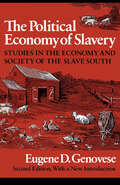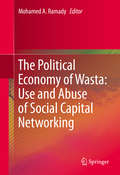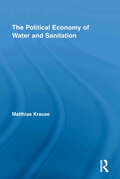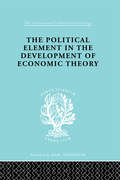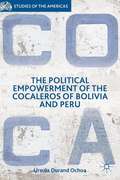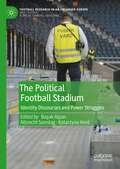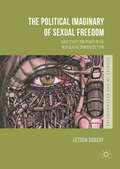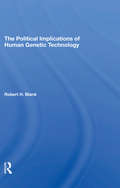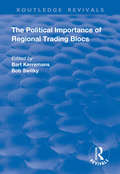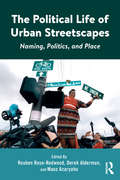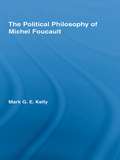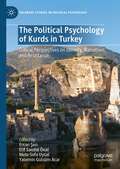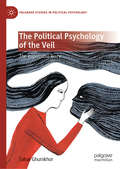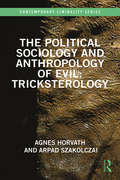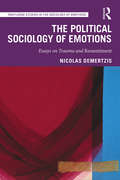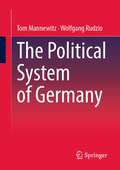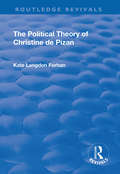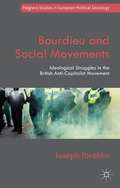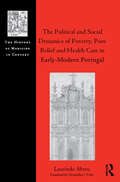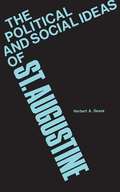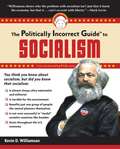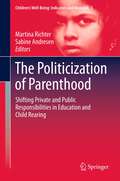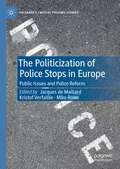- Table View
- List View
The Political Economy of Slavery: Studies in the Economy and Society of the Slave South
by Eugene D. GenoveseThis classic study of antebellum Southern society demonstrates how slavery was the bedrock of the region’s social order and cultural identity.In The Political Economy of Slavery, Eugene Genovese argues that slavery gave the South a distinct class structure, political community, economy, ideology, and a set of psychological patterns. As a result, the South grew away from the rest of the nation and became increasingly unstable during the nineteenth century. The difficulties it faced—economic, political, moral, and ideological—constituted a fundamental antagonism between modern and premodern worlds.Southern slavery was the foundation on which rose a powerful social class which, in turn, dominated Southern society. While they constituted only a tiny portion of the white population, they were powerful enough to largely succeed at building a new—or rather rebuilding an old—civilization.
The Political Economy of Wasta: Use and Abuse of Social Capital Networking
by Mohamed A. RamadyThe term 'wasta stems from the Arabic root for 'middle' or 'medium' and describes the phenomenon of using 'connections' to find job, government services or other favors to circumvent bureaucracy or bypass the system as a whole. The effects of 'wasta' may be both positive or negative, and is not a phenomenon that is particular to the Arab or Muslim world, but also to many other cultures and regions of the world, with similar concepts popularly known as ubuntu, guanxi, harambee, naoberschop, or "old boy network" used in African, Chinese and European societies. By its very nature 'wasta' is an area of grey or even black information, and, like corruption to which it is most often associated, is hard to assess although country corruption perception indexes attempt to provide a quantifiable basis. In the final analysis such ratings are based on perceptions of corruption, and this perception may vary strongly depending on different societal structures and cultural modes, whether these are extended family systems, tribal, clans or more atomized societies where relationships are essentially transactional and rule based. In a western perspective where 'wasta' may be considered as a form of corruption, in other societies it may be perceived as something 'natural' and not criminal, and using one's 'wasta' in tribal societies to help clan members is seen as a duty. The difference stems from the 'innocent ' use of 'wasta' to make introductions, as opposed to its abuse in placing unqualified persons in positions . The volume brings together academics and professional experts to examine a range of multi-faceted social, economic and political issues raised by the use and abuse of social networking, covering various topics like: 'wasta' interpersonal connections in family and business ties, The relationship between inequality-adjusted human development and corruption perception indexes in the Gulf region, 'wasta' and business networking, assessing the economic cost of 'wasta', 'wasta' and its impact on quality oriented education reform and the perceptions of young people, The use of 'wasta' to overcome socio-cultural barriers for women and men The volume also offers insights into social relations and ethics, and how the use of 'wasta' contradicts with common held religious principles, along with some country studies on Islamic principles and the use of 'wasta'. Mohamed Ramady is a Visiting Associate Professor, King Fahd University of Petroleum and Minerals, Saudi Arabia.
The Political Economy of Water and Sanitation (Routledge Studies in Development and Society #Vol. 20)
by Matthias KrauseAccording to recent estimates, around 6,000 people – mostly children under five – die every day from diseases caused by inappropriate water and sanitation (WS) services. Much of the academic and political debate surrounding this issue has focused on private sector participation. By shifting the attention towards the influence of governance, Krause examines the political and sectoral institutions that are essential for the provision of WS services. Utilizing data from sixty-nine developing countries, Matthias Krause demonstrates that the level of democracy has a statistically significant positive impact on access to WS services and that low-quality governance of sub-national governments compromises the internal efficiency of providers and the widespread access to services. This book makes a critical contribution to the water and sanitation research and will help academics and policy-makers to rethink the way in which they deal with water issues.
The Political Element in the Development of Economic Theory: A Collection of Essays on Methodology (International Library of Sociology)
by Gunnar MyrdalFirst Published in 1998. Routledge is an imprint of Taylor & Francis, an informa company.
The Political Empowerment of the Cocaleros of Bolivia and Peru
by Ursula Durand OchoaThis book offers a comparative analysis of the distinct experiences of the Peruvian and Bolivian cocaleros as political actors. In doing so, it illustrates how coca, an internationally criminalzsed good, affected the path and outcome of cocalero political empowerment in each case.
The Political Football Stadium: Identity Discourses and Power Struggles (Football Research in an Enlarged Europe)
by Albrecht Sonntag Başak Alpan Katarzyna HerdThis book focuses on the football stadium as a political space and examines how stadiums can be viewed as the objects and catalysts of political change. Rather than acting as functional constructions designed merely to host football games, stadiums stand out in the urban landscape as landmarks that serve as gathering points for large communities.The manifestation of the political in football stadiums can be heard in the discontent voiced by supporter activism; in the use of stadiums for national and local identity politics; in attempts to instrumentalize emotions by both totalitarian and democratic regimes; among fan groups in political uprisings, and in the surveillance of fans through e-tickets and seat allocation.This edited collection brings together a variety of case studies from a wide range of different contexts. Contributors stem from political science, sociology, history, anthropology, human geography and urbanism. As such, the book redefines and broadens what we understand as the political dimension of the football stadium.
The Political Geography of Inequality
by Pablo BeramendiThis book is a study of the politics of redistribution and inequality in political unions. It addresses two questions: why some political systems have more centralized systems of interpersonal redistribution than others, and why some political unions make larger efforts to equalize resources among their constituent units than others. This book presents a new theory of the origin of fiscal structures in systems with several levels of government. The argument points to two major factors to account for the variation in redistribution: the interplay between economic geography and political representation on the one hand, and the scope of interregional economic externalities on the other. To test the empirical implications derived from the argument, the book relies on in-depth studies of the choice of fiscal structures in unions as diverse as the European Union, Canada, and the United States in the aftermath of the Great Depression; Germany before and after Reunification; and Spain after the transition to democracy.
The Political Imaginary of Sexual Freedom: Subjectivity and Power in the New Sexual Democratic Turn (Studies in the Psychosocial)
by Leticia SabsayThis book develops a performative and relational approach to gendered and sexualised bodies conceived as distinct from the more limited individualistic idea of sexual identity and orientation that is at play within notions of progress in contemporary transnational sexual politics. Focusing on the psychosocial dimension of sexual life, Sabsay challenges accepted ideas of increased emancipation, and the steady extension of rights, offering instead a critique of the liberal imaginary that is at the base of the sexual rights-bearing subject. The book offers a notion of sexual embodiment that provides an alternative to individualism, one that is social, radically relational and psychically divided, and that implies a different conception of democratic sexual politics for our time.This book brings together political and cultural analysis of sexual rights discourse with a strong theory of the relational subject whose political investments and articulations depend on a political imaginary. This is a highly original and methodical text which will be of particular interest to academics and scholars of gender and sexuality studies, sociology, politics and psychology.
The Political Implications Of Human Genetic Technology
by Robert H. BlankHuman genetic technology has advanced rapidly in recent years to the point where amniocentesis is commonplace and in vitro fertilization has been successful. On the horizon looms the specter of human cloning and genetic engineering, raising a storm of new moral and ethical questions. These questions, asserts the author, are not the only ones to be considered; the impact and role of public policy are equally critical. What part should the state play in human genetic intervention? To what extent does a democratic society have the duty to take steps to reduce genetic disease and improve the quality of life through genetic engineering? If society has such responsibility, at what stage does societal good preempt individual rights? What is society's obligation toward future generations and is genetic manipulation justifiable on these grounds? After surveying the state of the art, the author grapples with these questions, contending that decisions ultimately will not be based on ethical and moral grounds –they will be fought out in the political arena.
The Political Importance of Regional Trading Blocs (Routledge Revivals)
by Bart Kerremans Bob SwitkyThis title was first published in 2000. This text addresses concerns about regional trade agreements. From a variety of political and economic angles, it explains the emergence of trade blocs, their internal policies and politics, and their effects on global trade. It does not provide sequential descriptions and analyses of each of the world's major trading blocs. The focus here is on a number of causal factors that help explain the emergence of trading blocs and the development of their relations to and effects on the multilateral trading system. In each chapter, attempts have been made to draw theoretical and case-based generalizations that may apply to other trade blocs than the used in the empirical analyses.
The Political Life of Urban Streetscapes: Naming, Politics, and Place
by Maoz Azaryahu Reuben Rose-Redwood Derek AldermanStreetscapes are part of the taken-for-granted spaces of everyday urban life, yet they are also contested arenas in which struggles over identity, memory, and place shape the social production of urban space. This book examines the role that street naming has played in the political life of urban streetscapes in both historical and contemporary cities. The renaming of streets and remaking of urban commemorative landscapes have long been key strategies that different political regimes have employed to legitimize spatial assertions of sovereign authority, ideological hegemony, and symbolic power. Over the past few decades, a rich body of critical scholarship has explored the politics of urban toponymy, and the present collection brings together the works of geographers, anthropologists, historians, linguists, planners, and political scientists to examine the power of street naming as an urban place-making practice. Covering a wide range of case studies from cities in Europe, North America, Sub-Saharan Africa, and Asia, the contributions to this volume illustrate how the naming of streets has been instrumental to the reshaping of urban spatial imaginaries and the cultural politics of place.
The Political Philosophy of Michel Foucault (Routledge Studies in Social and Political Thought #Vol. 61)
by Mark G.E. KellyThis book is the first to systematically reconstruct Michel Foucault’s political and philosophical thought across his career. It argues, in the areas of epistemology, power, subjectivity, resistance, politics, and ethics, that Foucault’s work represents the articulation of a consistent and progressive philosophical and political viewpoint. The work is thus an important intervention into the field of Foucault studies, where many continue to claim that Foucault’s work is contradictory, nonsensical, or nihilistic.
The Political Psychology of Kurds in Turkey: Critical Perspectives on Identity, Narratives, and Resistance (Palgrave Studies in Political Psychology)
by Yasemin Gülsüm Acar Ercan Şen Elif Sandal Önal Mete Sefa UysalResearch into Kurdishness touches on many of the important global issues within contemporary social and political psychology - questions about the rigors of methodology, the importance of reflexivity, issues of replicability, and the role of decolonization in research on actors in intractable conflicts. This volume will provide an in-depth account of historical and contemporary research on Kurdishness in Turkey, including research on social identity, conflict and conflict resolution, as well as collective action and resistance. It will also address methodological issues, including fieldwork in conflict zones, reflexivity in research, and intersectionality. This volume also provides lessons from related disciplines such as Kurdish studies and sociology to provide political psychologists some insight into their own research practices from disciplines wherein questions of intersectionality and reflexivity have long been ongoing.
The Political Psychology of the Veil: The Impossible Body (Palgrave Studies in Political Psychology)
by Sahar GhumkhorVeiled women in the West appear menacing. Their visible invisibility is a cause of obsession. What is beneath the veil more than a woman? This book investigates the preoccupation with the veiled body through the imaging and imagining of Muslim women. It examines the relationship between the body and knowledge through the politics of freedom as grounded in a ‘natural’ body, in the index of flesh. The impulse to unveil is more than a desire to free the Muslim woman. What lies at the heart of the fantasy of saving the Muslim woman is the West’s desire to save itself. The preoccupation with the veiled woman is a defense that preserves neither the object of orientalism nor the difference embodied in women’s bodies, but inversely, insists on the corporeal boundaries of the West’s mode of knowing and truth-making. The book contends that the imagination of unveiling restores the West’s sense of its own power and enables it to intrude where it is ‘other’ – thus making it the centre and the agent by promising universal freedom, all the while stifling the question of what freedom is.
The Political Sociology and Anthropology of Evil: Tricksterology (Contemporary Liminality)
by Agnes Horvath Arpad SzakolczaiThis book offers a new approach to the problem of evil through an examination of the anthropological figure of the ‘trickster’. A lesser known and much more recent term than evil, the authors use the trickster to facilitate a greater understanding of the return of evil in the modern era. Instead of simply opposing ‘good’ and ‘evil’, the figure of the trickster is used to pursue the trajectories of similarities and quasi-similarities through imitation. After engaging with the trickster as presented in comparative anthropology and mythology, where it appears in tales and legends as a strange, erratic outsider, the authors seek to gain an inside perspective of trickster knowledge through an examination of mythology and the classical world, including both philosophers and poets. The book then goes on to trace the trickster through prehistory, using archaeological evidence to complement the diverse narratives. In this way, and by investigating the knowledge and customs surrounding evil, the authors use the figure of the trickster to provide an unprecedented diagnosis of the contemporary world, where external, mechanical rationality has become taken for granted and even considered as foundational in politics, economics, and technologised science. The authors advance the idea that the modern world, with its global free markets, mass mediatic democracy and technologised science, represents a universalisation of trickster logic. The Political Sociology and Anthropology of the Evil will be of interest to scholars working in the fields of social theory, political anthropology and political sociology, as well as those interested in the ways in which evil can infiltrate reality.
The Political Sociology of Emotions: Essays on Trauma and Ressentiment (Routledge Studies in the Sociology of Emotions)
by Nicolas DemertzisThe Political Sociology of Emotions articulates the political sociology of emotions as a sub-field of emotions sociology in relation to cognate disciplines and sub-disciplines. Far from reducing politics to affectivity, the political sociology of emotions is coterminous with political sociology itself plus the emotive angle added in the investigation of its traditional and more recent areas of research. The worldwide predominance of affective anti-politics (e.g., the securitization of immigration policies, reactionism, terrorism, competitive authoritarianism, nationalism and populism, etc.) makes the political sociology of emotions increasingly necessary in making the prospects of democracy and republicanism in the twenty-first century more intelligible. Through a weak constructionist theoretical perspective, the book shows the utility of this new sub-field by addressing two central themes: trauma and ressentiment. Trauma is considered as a key cultural-political phenomenon of our times, evoking both negative and positive emotions; ressentiment is a pertaining individual and collective political emotion allied to insecurities and moral injuries. In tandem, they constitute fundamental experiences of late modern times. The value of the political sociology of emotions is revealed in the analysis of civil wars, cultural traumas, the politics of pity, the suffering of distant others in the media, populism, and national identities on both sides of the Atlantic.
The Political System of Germany
by Wolfgang Rudzio Tom MannewitzThe textbook introduces the self-understanding, institutional structure and practice of the political system of the Federal Republic of Germany. The work provides a problem-oriented overview of the basic constitutional and foreign policy decisions that have constituted German democracy; the political field of forces formed by interest groups, citizens' initiatives, parties and mass media; the political institutions at the federal, state and local levels; the social reach and administrative enforcement of political decisions; the political culture including the structure of the political ruling class. The new edition also addresses, among other things, the consequences of the Corona crisis for the political system, the changing party system and the crisis of the EU after the 2021 federal election.
The Political Theory of Christine De Pizan (Routledge Revivals)
by Kate Langdon ForhanThis title was first published in 2002: Christine de Pizan held no political office and her work was not influencial on any political theorist living today. However, in the disciplines of women's studies and French literature she has inspired intellectual debate, so much that the two sides of the debate are referred to as Christinophiles and Christinoclasts. This book persents the political paradoxes of Christine de Pizan. She was a woman in a man's world, an Italian at a French court, and the daughter of a civil servant in a world structured by social class. Her corpus of political works include five works designed to educate the male ruling class, two works expressly princesses and a treatise on warfare. The goal of this book is to outline the political theory of Christine de Pizan and situate her ideas within the history of political ideas in general.
The Political Uses of Expert Knowledge: Immigration Policy and Social Research
by Christina BoswellWhy do politicians and civil servants commission research, and what use do they make of it in policymaking? The received wisdom is that research contributes to improving government policy. Christina Boswell challenges this view, arguing that policymakers are just as likely to value expert knowledge for two alternative reasons: as a way of lending authority to their preferences; or to signal their capacity to make sound decisions. Boswell develops a compelling new theory of the role of knowledge in policy, showing how policymakers use research to establish authority in contentious and risky areas of policy. She illustrates her argument with an analysis of European immigration policies, charting the ways in which expertise becomes a resource for lending credibility to controversial claims, underpinning high-risk decisions or bolstering the credibility of government agencies. This book will make fascinating reading for those interested in the interface between policymaking, academic research and political legitimacy.
The Political Web
by Peter DahlgrenAs democracy encounters difficulties, many citizens are turning to the domain of alternative politics and, in so doing, making considerable use of the new communication technologies. This volume analyses the various factors that shape such participation, and addresses such key topics as civic subjectivity, web intellectuals, and cosmopolitanism.
The Political and Social Dynamics of Poverty, Poor Relief and Health Care in Early-Modern Portugal (The History of Medicine in Context)
by Laurinda AbreuBy the end of the fifteenth century most European counties had witnessed a profound reformation of their poor relief and health care policies. As this book demonstrates, Portugal was among them and actively participated in such reforms. Providing the first English language monograph on this this topic, Laurinda Abreu examines the Portuguese experience and places it within the broader European context. She shows that, in line with much that was happening throughout the rest of Europe, Portugal had not only set up a systematic reform of the hospitals but had also developed new formal arrangements for charitable and welfare provision that responded to the changing socioeconomic framework, the nature of poverty and the concerns of political powers. The defining element of the Portuguese experience was the dominant role played by a new lay confraternity, the confraternity of the Misericórdia, created under the auspices of King D. Manuel I in 1498. By the time of the king's death in 1521 there were more than 70 Misericórdias in Portugal and its empire, and by 1640, more than 300. All of them were run according to a unified set of rules and principles with identical social objectives. Based upon a wealth of primary source documentations, this book reveals how the sixteenth-century Portuguese crown succeeded in implementing a national poor relief and health care structure, with the support of the Papacy and local elites, and funded principally though pious donations. This process strengthened the authority of the royal government at a time which coincided with the emergence of the early modern state. In so doing, the book establishes poor relief and public health alongside military, diplomatic and administrative authorities, as the pillars of centralization of royal power.
The Political and Social Ideas of St. Augustine
by Herbert A. DeaneHerbert A. Deane discusses St. Augustine's views on humankind, society, and the state, in terms of Augustine's theological, political, and social thought. Deane writes in his Preface that Augustine did not have a systematic philosophy. Because of this, the author's writes that his second aim of his book is to organize his ideas into the above categories. Deane, not only elucidates Augustine's thought clearly, he also substantiates his elucidation with massive quotations from Augustine's writings and from the writings of other philosophers, theologians, and political and social analysts and critics. The following quotations are taken from the back cover of the book: In describing Augustine, the author captures the essence of the man in these words: "Genius he had in full measure . . . he is the master of the phrase or the sentence that embodies a penetrating insight, a flash of lightning that illuminates the entire sky; he is the rhetorician, the epi-grammist, the polemicist, but not the patient, logical systematic philosopher." "Professor Deane has been remarkably successful in keeping different facets of Augustine's multi-dimensional thought in view . . . [he] significantly contributes both to historical understanding of Augustine's political thinking and to appreciation of its permanent relevance to the moral dilemmas of politics."
The Politically Incorrect Guide to Socialism
by Kevin D. WilliamsonStalin's gulag, impoverished North Korea, collapsing Cuba. . . it's hard to name a dogma that has failed as spectacularly as socialism. And yet leaders around the world continue to subject millions of people to this dysfunctional, violence-prone ideology. In The Politically Incorrect Guide TM to Socialism, Kevin Williamson reveals the fatal flaw of socialism--that efficient, complex economies simply can't be centrally planned. But even in America, that hasn't stopped politicians and bureaucrats from planning, to various extents, the most vital sectors of our economy: public education, energy, and the most arrogant central-planning effort of them all, Obama's healthcare plan. In this provocative book, Williamson unfolds the grim history of socialism, showing how the ideology has spawned crushing poverty, devastating famines, and horrific wars. Lumbering from one crisis to the next, leaving a trail of economic devastation and environmental catastrophe, socialism has wreaked more havoc, caused more deaths, and impoverished more people than any other ideology in history--especially when you include the victims of fascism, which Williamson notes is simply a variant of socialism. Williamson further demonstrates: Why, contrary to popular belief, socialism in theory is no better than socialism in practice Why socialism can't exist without capitalism How the energy powerhouse of Venezuela, under socialism, has become an economic basket case subject to rationing and blackouts How socialism, not British colonialism, plunged the bountiful economy of India into stagnation and dysfunction--and how capitalism is rescuing it Why socialism is inextricably linked to communism If you thought socialism went into the dustbin of history with the collapse of the Soviet Union, think again. Socialism is alive and kicking, and it's already spread further than you know.
The Politicization of Parenthood
by Sabine Andresen Martina RichterCurrently, families are being subjected to increasing public attention. Interest is focussing on their potential strengths and weaknesses in determining how well children do at school. Alongside such human-development oriented expectations, families are also becoming a focus of attention as a resource for human capital in times of economic crises and criticism of the welfare state. In many European countries, parents and children are at the forefront of the welfare state and socio-educational activities in current programs and policies. The current transformation processes in the welfare state are making the relationship between families and the state more dynamic in general, and they are structuring the discourses on the childrearing, education, and child care services in the fields of both public and private responsibility. The introduction of all-day schooling in Germany also has to be viewed in this context. This is gradually changing the traditional half-day structure of German schools and shifting the borders of public and private responsibility on the levels of education, child care, and childrearing institutions. The attention given to parental childrearing and educational responsibility within the context of current national and international debates clearly underlines the fact that issues in private life are increasingly entering the public discourse and becoming subject to attempts at socio-political control. This raises the assumption of an increasing politicization of parenthood in the (post) welfare state that is focusing more and more attention on the structural conditions of gainful employment and child care as well as on the current relations between the genders. This context particularly emphasizes the time and care regimes that decisively determine the practices in daily family life and the utilization of all-day education settings.
The Politicization of Police Stops in Europe: Public Issues and Police Reform (Palgrave's Critical Policing Studies)
by Mike Rowe Jacques De Maillard Kristof VerfaillieThis book examines the timely issue of police stops as a public and political issue, focussing on the European states. Contrary to much other work it focuses on wider Europe and the social and political context in which the police practice of stopping citizens emerges, develops and can be curtailed. More specifically, the volume analyses public controversies about police stops, i.e. events in which conflicts emerge about how the performance of police stops is explained and justified. This book stems from an EU COST Action research network on Police Stops which engages academics and practitioners from 29 countries. It appeals to those in law, criminology and policing studies with some potential for wider interest in cultural studies/history and public policy/politics, as well as to practitioners in police scrutiny, oversight and other professional bodies and in training organisations.
